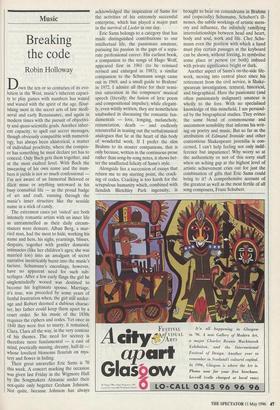Music
Breaking the code
Robin Holloway
Down the ten or so centuries of its evo- lution in the West, music's inherent capaci- ty to play games with numbers has waxed and waned with the spirit of the age, flour- ishing most in the secret arts of late medi- aeval and early Renaissance, and again in modern times with the pursuit of objectivi- ty and quasi-scientific goals. Another inher- ent capacity, to spell out secret messages, though obviously compatible with numerol- ogy, has always been ahistorical, a matter of individual proclivity, where the compos- er has something he must declare yet has to conceal. Only Bach gets them together, and at the most exalted level. With Bach the inweaving of his own name and the num- bers it yields is not so much confessional I'm not aware of an Immortal Beloved or illicit muse or anything untoward in his busy connubial life — as the proud badge of art and craft, running through the music's inner structure like the seaside name in a stick of candy.
The extremest cases yet `outed' are both intensely romantic artists with an inner life as untrammelled as their daily circum- stances were demure. Alban Berg, a mar- ried man, had the most to hide, working his name and hers, his sighs, yearnings, blisses, despairs, together with gentler domestic intimacies (like her children's ages; she was married too) into an amalgam of secret narrative inextricably burnt into the music's facture. Schumann's encodings, however, have no apparent need for such sub- terfuges. After a few early flings the girl he singlemindedly wooed was destined to become his legitimate spouse. Marriage, it's true, was preceded by some years of fretful frustration when, the girl still under- age and Robert deemed a dubious charac- ter, her father could keep them apart by a court order. So his music of the 1830s requires the ciphers and codes. Yet once in 1840 they were free to marry, it remained, Clara, Clara all the way, in the very contour of his themes. The need for secrecy is therefore more fundamental — a cast of mind, poetically musing, dreamy, half-lit whose loveliest blossoms flourish on mys- tery and flower in hiding. Their great unraveller Eric Sams is 70 this week. A concert marking the occasion was given last Friday in the Wigmore Hall by the Songmakers Almanac under their not-quite only begetter Graham Johnson. Not quite, because Johnson has always acknowledged the inspiration of Sams for the activities of his extremely successful enterprise, which has played a major part in the survival of Lieder in our day.
Eric Sams belongs to a category that has made distinguished contributions to our intellectual life, the passionate amateur, pursuing his passion in the gaps of a sepa- rate professional career. His earliest book, a companion to the songs of Hugo Wolf, appeared first in 1961 (to be reissued revised and enlarged in 1983); a similar companion to the Schumann songs came out in 1969, and a small guide to Brahms' in 1972. I admire all three for their sensi- tive saturation in the composers' musical speech (literally; the fusion of lyric poem and compositional impulse); while elegant- ly, even wittily written, they are nonetheless unabashed in discussing the romantic fun- damentals — love, longing, melancholy, renunciation, death — and endlessly resourceful in teasing out the verbal/musical analogues that lie at the heart of this body of wonderful work. If I prefer the slim Brahms to its stouter companions, that is only because, written in the continuous prose rather than song-by-song notes, it shows bet- ter the unaffected felicity of Sams's style.
Alongside lies a succession of essays that return me to my starting point, the crack- ing of codes. Cracking is too harsh for the scrupulous humanity which, combined with fiendish Bletchley Park ingenuity, is brought to bear on conundrums in Brahms and (especially) Schumann, Schubert's ill- nesses, the subtle workings of artistic mem- ory and influence, the infinitely ramifying interrelationships between head and heart, body and soul, work and life. Chez Schu- mann even the position with which a hand must play certain passages at the keyboard can be shown, without forcing, to symbolise some place or person (or both) imbued with private significance bright or dark.
Another aspect of Sams's on-the-side life- work, moving into central place since his retirement from the civil service, is Shake- spearean investigation, textural, historical, and biographical. Here the passionate (and often passionately indignant) amateur is wholly to the fore. With no specialised knowledge of this minefield, I am persuad- ed by the biographical studies. They evince the same blend of commonsense and uncommon sensibility that informs his writ- ing on poetry and music. But so far as the attribution of Edmund Ironside and other contentious Shakespeare juvenilia is con- cerned, I can't help feeling not only indif- ference but impatience! Why worry so at the authenticity or not of this sorry stuff when an aching gap at the highest level of artistic achievement cries out for just the combination of gifts that Eric Sams could bring to it? A comprehensive account of the greatest as well as the most fertile of all song composers, Franz Schubert.


































































 Previous page
Previous page